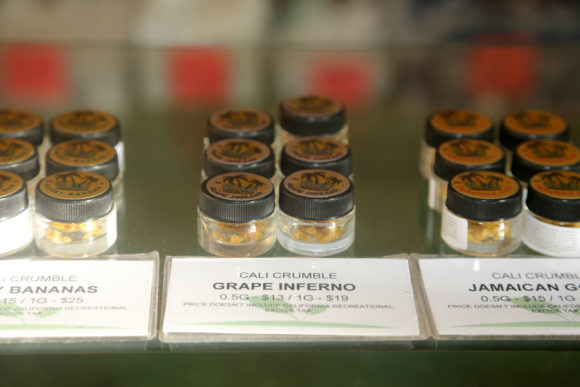Marijuana access leads to reductions in opioid-related deaths, according to new research using data from 1999 through 2017.
Investigators found that legalization and access to recreational marijuana cause a significant decline in opioid mortality with particularly pronounced benefits in states that have legalized recreational usage. Legalization reduced annual opioid mortality in the range of 20% to 35%, especially deaths related to synthetic opioids.
“Yet it is not legalization, per se, that produces these gains; rather, states that have legal access via dispensaries see the largest reductions in mortality,” the study says.
The study, published by Economic Inquiry, a publication of the Western Economic Association International, focused on the causal effect of medical marijuana laws and recreational marijuana laws on opioid mortality.
“Recreational marijuana laws affect a much larger population than medical marijuana laws, yet we know relatively little about their effects,” said co-author Nathan W. Chan, PhD, assistant professor, Department of Resource Economics, University of Massachusetts at Amherst. “Focusing on the recent wave of recreational marijuana laws in the U.S., we find that opioid mortality rates drop when recreational marijuana becomes widely available via dispensaries.”
Chan was joined in the research by Nathan Burkhardt, assistant professor, Agricultural and Resource Economics, Colorado State University, and Matthew Flyr, also with the department of Agricultural and Resource Economics, Colorado State University
The research is consistent with prior findings that medical marijuana laws reduce opioid mortality rates. The authors cite a research (Bachhuber et al.(2014) on the relationship between medical marijuana laws and opioid overdose mortality rates between 1999 and 2010. That study reported a reduction in overdose rates of 24.8% in medical marijuana law states. Another recent study by (Powell, Pacula, and Jacobson 2018) examined medical marijuana laws’ effects on painkiller use, particularly on addiction and state‐level overdose deaths. They found a 21% decrease in opioid mortality due to medical marijuana. laws through 2010.
The authors of this latest study call the causal effect they identified as “highly robust” as it was tested with variations in modeling assumptions, control variables and placebos.
“Our results show that there are substantial ancillary benefits to marijuana legalization, especially RMLs (recreational marijuana laws), and they offer important food for thought as many states continue to contemplate expansions to both medical and recreational marijuana access,” the authors write.
For their research data they combined three principal sources along with supplementary controls. They used mortality data from the Centers for Disease Control’s National Vital Statistics System from January 1999 through the end of 2017. They compiled information on the legal history of marijuana in each state. In their study period, 29 states and the District of Columbia legalized medical marijuana. Among those, eight states and the District of Columbia also legalized recreational marijuana. Third, they merged demographic control variables from the U.S. Census including income, race and ethnicity, sex, age groups, and population, at the state‐level and obtained unemployment rates from the Bureau of Labor Statistics.
The study notes that there were around 47,600 deaths from opioids nationwide in 2017, or roughly 14.9 per 100,000 people. A reduction of 21% would imply nearly 10,000 lives saved or a decrease of 3.1 deaths per 100,000 people, enough to offset roughly two years of growth during the opioid boom, although the authors add that this may overstate the reduction.
This study appears to clash with another that shoots down the notion that medical marijuana laws can prevent opioid overdose deaths. Researchers at Stanford University School of Medicine said they found the reverse: States passing medical marijuana laws saw a 23% higher than expected rate of deaths involving prescription opioids.
Legalizing medical marijuana “is not going to be a solution to the opioid overdose crisis,” said Chelsea Shover of Stanford University School of Medicine. “It would be wonderful if that were true, but the evidence doesn’t suggest that it is.”
Legalization may have various public health and safety effects. Prior research has shown that expanded access and usage of marijuana products is associated with changes in stroke risk (Rumalla, Reddy, and Mittal 2016), alcohol consumption (Anderson, Hansen, and Rees 2013), and automobile fatalities (Anderson, Hansen, and Rees 2013).
Related:
- Study Debunks Theory That Legalized Marijuana Helps Prevent Opioid Deaths
- U.S. Boosting Marijuana Crop Available for Research
- First States to Legalize Marijuana See Rise in Car Insurance Claims, Research Shows
Topics Agribusiness Cannabis
Was this article valuable?
Here are more articles you may enjoy.



 Experian Launches Insurance Marketplace App on ChatGPT
Experian Launches Insurance Marketplace App on ChatGPT  AI Claim Assistant Now Taking Auto Damage Claims Calls at Travelers
AI Claim Assistant Now Taking Auto Damage Claims Calls at Travelers  Lemonade Books Q4 Net Loss of $21.7M as Customer Count Grows
Lemonade Books Q4 Net Loss of $21.7M as Customer Count Grows  Preparing for an AI Native Future
Preparing for an AI Native Future 

